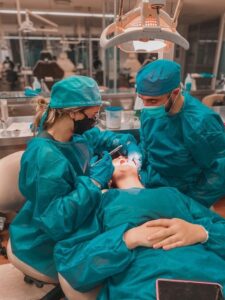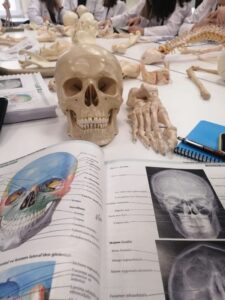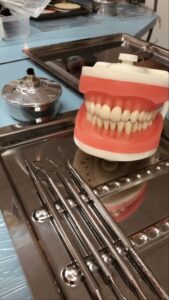DMD course details
Dentistry is a branch of medicine that focuses on the study, diagnosis, prevention, and treatment of conditions, disorders, and diseases related to the oral cavity and maxillofacial area. Here are some key details about a Dentistry course:
1. **Degree Offered:**
Dentistry programs typically lead to a Doctor of Dental Medicine (DMD) or Doctor of Dental Surgery (DDS) degree.
2. **Duration:**
The duration of a Dentistry course is generally around four years for the basic dental degree.
3. **Curriculum:**
– **Preclinical Years:** Students learn the basic sciences related to dentistry, such as anatomy, physiology, biochemistry, and pathology.
– **Clinical Years:**
Clinical training begins, where students gain hands-on experience in diagnosing and treating patients. This includes learning about restorative dentistry, oral surgery, periodontics, orthodontics, and other specialties.
4. **Clinical Practice:**
Dental students often work in dental clinics under the supervision of experienced faculty, treating patients and performing various dental procedures.
5. **Specializations:**
Dentistry offers various specializations, including Orthodontics, Oral and Maxillofacial Surgery, Periodontics, Pediatric Dentistry, and more.
6. **Licensing:**
After completing the dental program, graduates need to obtain a license to practice dentistry. Licensing requirements vary by country or region.
7. **Continuing Education:**
Dentists often engage in continuing education to stay updated on the latest advancements in dental technology and techniques.
8. **Skills Developed:**
Dentistry students develop skills in oral diagnosis, treatment planning, communication with patients, and manual dexterity for performing dental procedures.
9. **Clinical Rotations:**
Students may undergo clinical rotations in different dental specialties to gain exposure to a wide range of dental conditions and treatments.
10. **Ethics and Professionalism:**
Emphasis is placed on ethical considerations and professionalism in patient care.
It’s important to note that specific details may vary between dental schools and regions. Prospective dentistry students should check with the institutions they are interested in for precise curriculum and admission requirements.
DMD syllabus:-
The specific syllabus for a Doctor of Dental Medicine (DMD) course can vary among institutions. However, here’s a general overview of common topics covered:
1. **Pre-Clinical Subjects:**
– Anatomy
– Biochemistry
– Physiology
– Dental Anatomy and Occlusion
2. **Basic Clinical Subjects:**
– Restorative Dentistry
– Prosthodontics (Crowns, Bridges, Dentures)
– Periodontics (Study of the supporting structures of teeth)
– Endodontics (Root canal treatment)
3. **Medical Sciences:**
– Pathology
– Microbiology
– Pharmacology
4. **Diagnostic Sciences:**
– Oral Radiology
– Oral Pathology
5. **Public Health Dentistry:**
– Community Dentistry
– Preventive Dentistry
6. **Clinical Rotations:**
– Rotations in various dental specialties
– Hands-on clinical training
7. **Research Methodology:**
– Introduction to research in dentistry
8. **Ethics and Professionalism:**
– Dental Ethics
– Professionalism in Dentistry
Remember, the specific courses and their sequencing can vary, so it’s advisable to check with the institution offering the DMD program for their detailed syllabus.
Fees for DMD course:-
The tuition fees for a Doctor of Dental Medicine (DMD) course can vary significantly depending on the country, institution, and whether you are an international or domestic student. Additionally, fees may cover tuition, materials, clinical practice, and other associated costs.
For accurate and up-to-date information, it’s best to check with the specific dental school or university where you are considering pursuing the DMD program. They usually provide detailed information on their official websites or through their admissions offices. Keep in mind that fees can change, so it’s crucial to get the most recent information directly from the source.
Name of college:-
Certainly! Here are some notable colleges that offer Doctor of Dental Medicine (DMD) programs:
1. Harvard School of Dental Medicine
2. University of Pennsylvania School of Dental Medicine
3. University of Florida College of Dentistry
4. Columbia University College of Dental Medicine
5. University of California, San Francisco, School of Dentistry
6. University of Michigan School of Dentistry
7. Boston University Henry M. Goldman School of Dental Medicine
8. University of North Carolina at Chapel Hill School of Dentistry
9. University of Maryland School of Dentistry
10. Tufts University School of Dental Medicine
Keep in mind that this is not an exhaustive list, and there are many other reputable dental schools around the world. It’s essential to research each program’s specific requirements and offerings to find the best fit for your academic and career goals.
DMD job opportunities:-
After completing a Doctor of Dental Medicine (DMD) course, you can explore various job opportunities in the field of dentistry. You can work as a general dentist, specializing in areas such as orthodontics, oral surgery, or pediatric dentistry. Other options include working in hospitals, clinics, or establishing your own dental practice. Additionally, research, teaching, or pursuing further specialization through postgraduate studies are potential paths. The demand for dental professionals often provides a range of opportunities for DMD graduates.





Can you be more specific about the content of your article? After reading it, I still have some doubts. Hope you can help me.
Can you be more specific about the content of your article? After reading it, I still have some doubts. Hope you can help me.
Thank you for your sharing. I am worried that I lack creative ideas. It is your article that makes me full of hope. Thank you. But, I have a question, can you help me?
Your article helped me a lot, is there any more related content? Thanks! https://www.binance.com/zh-CN/join?ref=VDVEQ78S
Thanks for sharing. I read many of your blog posts, cool, your blog is very good.
Thanks for sharing. I read many of your blog posts, cool, your blog is very good.
Thank you for your sharing. I am worried that I lack creative ideas. It is your article that makes me full of hope. Thank you. But, I have a question, can you help me?
I don’t think the title of your article matches the content lol. Just kidding, mainly because I had some doubts after reading the article.